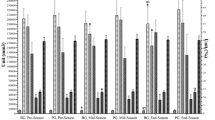Abstract
The present study aims to examine the effect of zinc supplementation on the release of some cytokines in young wrestlers actively involved in wrestling. A total of 40 male subjects of the same age group were included in the study: half were wrestlers and the other half were not involved in sports. The subjects were equally divided into four groups and treated during an 8-week period as follows: group 1, zinc-supplemented athletes; group 2, non-supplemented athletes; group 3, zinc-supplemented sedentary subjects, and group 4, non-supplemented sedentary group. Blood samples were taken from each subject at the beginning and at the end of the study period. The serum tumor necrosis factor-α (TNF-α), interleukin-2 (IL-2), and interpheron-γ levels (IFN-γ) were determined using the enzyme-linked immunosorbent assay method. At the beginning of the study, there were no significant differences of the measured parameters between the four study groups. At the end of the study, the levels of TNF-α, IL-2, and IFN-γ were significantly higher in the two zinc-supplemented groups compared to those that did not receive supplementation, regardless of the activity status (p < 0.01).
Similar content being viewed by others
References
Prasad AS (1998) Zinc in human health: an update. J Trace Elem Exp Med 11:63–87
Shankar AH, Prasad AS (1998) Zinc and immune function: the biological basis of altered resistance to infection. Am J Clin Nutr 68:447S–463S
Hadden JW (1998) Thymic endocrinology. Ann NY Acad Sci 840:352–358
Prasad AS, Beck FW, Endre L, Handschu W, Kukuruga M, Kumar G (1996) Zinc deficiency affects cell cycle and deoxythymidine kinase gene expression in HUT-78 cells. J Lab Clin Med 128:51–60
Koropatnick J, Zalups RK (1997) Effect of non-toxic mercury, zinc or cadmium pretreatment on the capacity of human monocytes to undergo lipopolysaccharide-induced activation. Br J Pharmacol 120:797–806
Micheletti A, Rossi R, Rufini S (2001) Zinc status in athletes: relation to diet and exercise. Sports Med 31:577–582
Cao GH, Chen JD (1991) Effects of dietary zinc on free radical generation, lipid peroxidation, and superoxide dismutase in trained mice. Arch Biochem Biophys 291:147–153
Dressenderfor RH, Wade CE, Keen CL, Scaff JH (1982) Plasma mineral levels in marathon runners during a 20-day road race. Phys Sportsmed 10:113–118
Couzy F, Lafargue P, Guezennec CY (1990) Zinc metabolism in the athlete: influence of training nutrition and other factors. Int J Sports Med 11:263–266
Khaled S, Brun JF, Cassanas G, Bardet L, Orsetti A (1999) Effects of zinc supplementation on blood rheology during exercise. Clin Hemorheol Microcirc 20:1–10
Konig D, Weinstock C, Keul J, Northoff H, Berg A (1998) Zinc, iron and magnesium status in athletes—influence on the regulation of exercise-induced stress and immune function. Exerc Immunol Rev 4:2–21
Singh A, Failla ML, Deuster PA (1994) Exercise-induced changes in immune function: effects of zinc supplementation. J Appl Physiol 76:2298–2303
Hurmeric V, Erdem U, Inal A, Bayraktar MZ (2006) Comparison of the cytokine profile in patients with uveitis. Gülhane Tip Dergisi 48:151–156
Hagobian TA, Jacobs KA, Subudhi AW, Fattor JA, Rock PB, Muza SR et al (2006) Cytokine responses at high altitude: effects of exercise and antioxidants at 4300 m. Med Sci Sports Exerc 38:276–285
Colbert LH, Visser M, Simonsick EM, Tracy RP, Newman AB, Kritchevsky SB et al (2004) Physical activity, exercise, and inflammatory markers in older adults: findings from the Health, Aging and Body Composition Study. J Am Geriatr Soc 52:1098–1104
Sellar CM, Syrotuik DG, Field CJ, Bell GJ (2006) The effect of dietary control and carbohydrate supplementation on the immune and hormonal responses to rowing exercise. Appl Physiol Nutr Metab 31:588–596
Dos Santos Cunha WD, Giampietro MV, De Souza DF, Vaisberg M, Seelaender MC, Rosa LF (2004) Exercise restores immune cell function in energy-restricted rats. Med Sci Sports Exerc 36:2059–2064
Nieman DC, Henson DA, Davis JM, Angela Murphy E, Jenkins DP, Gross SJ et al (2007) Quercetin’s influence on exercise-induced changes in plasma cytokines and muscle and leukocyte cytokine mRNA. J Appl Physiol 103:1728–1735
Petersen EW, Ostrowski K, Ibfelt T, Richelle M, Offord E, Halkjaer-Kristensen J et al (2001) Effect of vitamin supplementation on cytokine response and on muscle damage after strenuous exercise. Am J Physiol Cell Physiol 280:C1570–1575
Suzuki K, Nakaji S, Kurakake S, Totsuka M, Sato K, Kuriyama T et al (2003) Exhaustive exercise and type-1/type-2 cytokine balance with special focus on interleukin-12 p40/p70. Exerc Immunol Rev 9:48–57
Avula CP, Muthukumar AR, Zaman K, McCarter R, Fernandes G (2001) Inhibitory effects of voluntary wheel exercise on apoptosis in splenic lymphocyte subsets of C57BL/6 mice. J Appl Physiol 91:2546–2552
Moulder K, Steward MW (1989) Experimental zinc deficiency: effects on cellular responses and the affinity of humoral antibody. Clin Exp Immunol 77:269–274
Tanaka Y, Shiozawa S, Morimoto I, Fujita T (1990) Role of zinc in interleukin 2 (IL-2)-mediated T-cell activation. Scand J Immunol 31:547–552
Prasad AS, Beck FW, Grabowski SM, Kaplan J, Mathog RH (1997) Zinc deficiency: changes in cytokine production and T-cell subpopulations in patients with head and neck cancer and in noncancer subjects. Proc Assoc Am Physicians 109:68–77
Zoli A, Altomonte L, Caricchio R, Galossi A, Mirone L, Ruffini MP et al (1998) Serum zinc and copper in active rheumatoid arthritis: correlation with interleukin 1 beta and tumour necrosis factor alpha. Clin Rheumatol 17:378–382
Bao B, Prasad A, Beck FW, Suneja A, Sarkar F (2006) Toxic effect of zinc on NF-kappaB, IL-2, IL-2 receptor alpha, and TNF-alpha in HUT-78 (Th(0)) cells. Toxicol Lett 166:222–228
Bao B, Prasad AS, Beck FW, Godmere M (2003) Zinc modulates mRNA levels of cytokines. Am J Physiol Endocrinol Metab 285:E1095–1102
Author information
Authors and Affiliations
Corresponding author
Rights and permissions
About this article
Cite this article
Kara, E., Ozal, M., Gunay, M. et al. Effects of Exercise and Zinc Supplementation on Cytokine Release in Young Wrestlers. Biol Trace Elem Res 143, 1435–1440 (2011). https://doi.org/10.1007/s12011-011-9005-1
Received:
Accepted:
Published:
Issue Date:
DOI: https://doi.org/10.1007/s12011-011-9005-1




